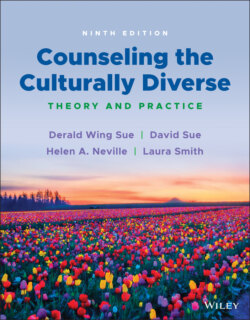Читать книгу Counseling the Culturally Diverse - Laura Smith L. - Страница 85
PEOPLE–NATURE DIMENSION
ОглавлениеTraditional Western thinking assumes the value of mastery of and control over nature. Accordingly, most therapists are trained to operate from a framework that subscribes to the belief that problems are solvable and that both therapist and client must take an active part in solving problems via manipulation and control. Active intervention is stressed in controlling or changing the environment. The four other ethnic groups listed in Table 3.2 come from traditions that view people in harmonious co‐existence with nature.
Confucian philosophy, for example, stresses a set of rules aimed at promoting loyalty, respect, and harmony among family members (Moodley & West, 2005). Harmony within the family and the environment leads to harmony within the self. Integration within the family unit and acceptance of the environment guide the solving of problems; while Western culture advocates defining and attacking problems directly, traditional Asian cultures tend to accommodate or deal with problems through indirection. In raising their children, many Asian people believe that it is better to avoid direct confrontation and to use deflection. A White family might deal with a child who has watched too many hours of TV by saying, “It's time to turn off the TV off and study.” To be more emphatic, the parent might say, “You'll be grounded unless the TV goes off!” An Asian parent might instead respond by saying, “That looks like a boring program; I think your friend John must be doing his homework by now,” or, “I think Father wants to watch his favorite program.” Such an approach stems from the wish to avoid conflict and to achieve balance and harmony among members of the family and the wider environment—values that continue to be associated with emotional well‐being among Chinese people (Wang, Wong, & Yeh, 2016).
Table 3.2 Cultural Value Preferences of Middle‐Class White European Americans and People of Color: A Comparative Summary
Source: Ho, M. K. (1987). Family therapy with ethnic minorities (p. 232). Newbury Park, CA: Sage. Copyright 1987 by Sage Publications. Reprinted by permission.
| Area of relationship | Middle‐class White Americans | Asian Americans | American Indians | Black Americans | Hispanic Americans |
|---|---|---|---|---|---|
| People to nature/environment | Mastery over | Harmony with | Harmony with | Harmony with | Harmony With |
| Time orientation | Future | Past–present | Present | Present | Past–present |
| People relations | Individual | Collateral | Collateral | Collateral | Collateral |
| Preferred mode of activity | Doing | Doing | Being‐in‐becoming | Doing | Being‐in‐becoming |
| Nature of people | Good and bad | Good | Good | Good and bad | Good |
In this way, the U.S. values that portray the domination of nature (i.e., conquering space, taming the wilderness, or harnessing nuclear energy) through control and manipulation of the universe can find reflection in family counseling perspectives. Family systems counseling theories attempt to describe, explain, predict, and control family dynamics. The therapist actively attempts to understand what is going on in the family system (structural alliances and communication patterns), identify the problems (dysfunctional aspects of the dynamics), and work on changing them directly or indirectly through manipulation and control (therapeutic interventions). Ethnic minorities or subgroups that view people as harmonious with nature or expect that nature may appropriately overwhelm people (“acts of God”) may find the therapist's mastery‐over‐nature approach inconsistent with or antagonistic to their worldview. Indeed, attempts to intervene actively in family patterns and relationships may themselves be perceived as a problem, because they might unbalance the existing harmony.
